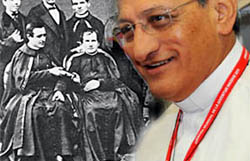

| RMG – The Rector Major meets the missionaries |
| RMG – The vocational fidelity of the Salesian |
| Italy – Communication and inculturation of the faith in north-east India |
(ANS – Rome) – The new circular letter of the Rector Major, following up the previous one on – Spirituality and Mission, Disciples and Apostles of the Risen Lord (AGC 410) – deals with a an extremely important aspect of the Salesian mission in the Church: the inculturation of the Salesian charism. It is very condensed and full of material.
The letter, dated 16 August 2011, the anniversary of Don Bosco’s birth, draws on the first letter to the Corinthians in which Paul declares “that he has freely become the slave of everyone in order to bring to faith in Christ the greatest number of people”. Paul the model of the missionary who “identifies himself totally with each one of those to whom he is sent, with the sole purpose of winning as many as possible for his Lord!”
The Salesian charism today, as in the past, needs to be implanted with fidelity and creativity. “Today the challenge is much more demanding, as we find ourselves present in all the continents and in contact with the most diverse cultures” –the Rector Major writes. “The Salesian mission will be meaningful and effective, and will therefore have a future, if we succeed in being at the same time faithful to ourselves and also “at home” in the cultural context in which it is carried out, that is to say if, thanks to his sons, Don Bosco knows how to assume the features of each of the cultures that welcomes him.”
The letter, full of quotations from Scripture, the Magisterium of the Church and of the Congregation, and especially the Constitutions, is in four parts.
The first is entitled– The Law of all evangelisation –“The [inculturated] accommodated preaching of the revealed Word ought to remain the law of all evangelisation,” the Rector Major writes quoting Benedict XVI.
Nowadays the Congregation carries out its mission in 132 countries which inevitably raises the question about the single charism and a plurality of cultures. “Changing cultural paradigms” is the subject of the second part. “The Salesian charism is one and the same, valid for all and for each individual; but it cannot be lived out in an univocal way; if it is not well rooted in the culture in which the community carries out its mission, it will not be able to release the potentialities for salvation it contains, neither will it have significance in the world of today, nor will it survive in tomorrow’s.” Globalisation, inter-religious dialogue, the youth situation, “the digital continent” to be leavened are facts which the Rector Major presents and which “best illustrate the change taking place and which raise questions about our way of living as consecrated educators and of carrying out our mission.”
A part follows dealing with the early Church, the model and norm for inculturated evangelisation. Giving the historical background with ample quotations from the New Testament, Fr Chávez describes the experience of the first Christian community.
In the fourth part devoted to Don Bosco “the missionary” the Rector Major suggests some essential elements for the successful planting and development of the Salesian charism so as to be “identified with Don Bosco, with his non-negotiable pastoral options, and with his pedagogical method which is right on the mark.”
The first is “a joyful and faithful practice of the Constitutions, sine glossa, but suited to the times and places of the mission, open to the culture of the place and of the young, a practice which, in addition to ensuring that we obey his words and make our own his choices, is a credible expression of our “staying with him” and a filial commitment to “doing as he did” for the salvation of the young.”. Then come the “special souvenirs” which Don Bosco gave the first missionaries on11 November 1875 and then took up again on various occasions.
Fr Chávez concludes saying that he wanted to deal with the subject of inculturation from the point of view not so much of the gospel as of the charism, so as to indicate that in every continent (Europe, America, Asia, Africa, Oceania, and the Digital Continent), in every kind of context (social, political, cultural and religious) and type of work (formal education, non-formal, informal, primary level, secondary level, university level of evangelisation or mission, of social development) the charism has to be inculturated.”
As has already been said this letter is very condensed and full of material; a single reading will not suffice. It provides many points for study and for personal and community reflection; the “special souvenirs,” for example, could be the subject of an assessment of the charismatic nature of the pastoral activity of each community and Province.
Two further important points could be highlighted:
The text is available in digital format on sdb.org – at present only in Italian, Portuguese ans English, and later in the other languages – and in the published Acts of the General Council n. 411.
Published 09/09/2011
